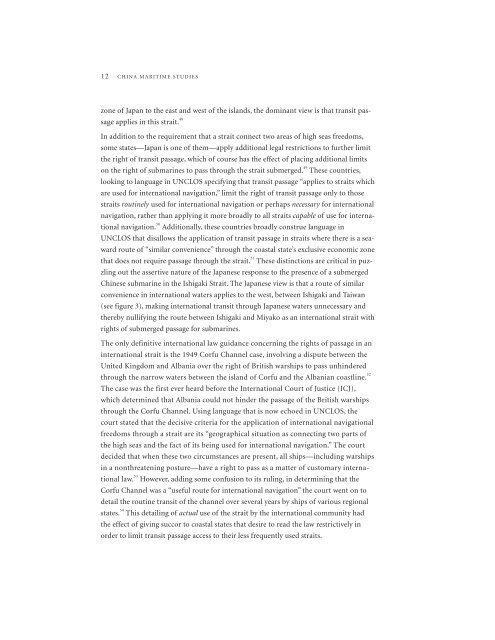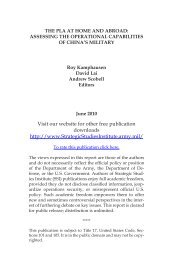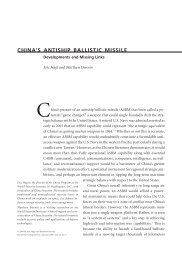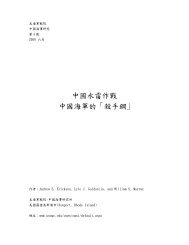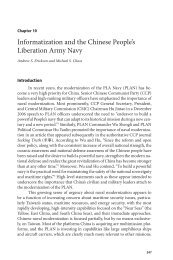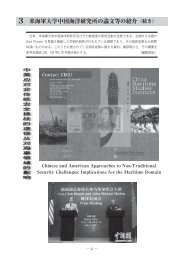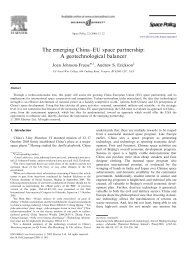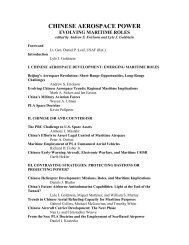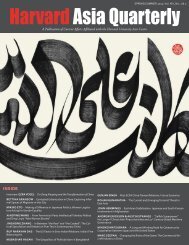Scouting, Signaling, and Gatekeeping - US Naval War College
Scouting, Signaling, and Gatekeeping - US Naval War College
Scouting, Signaling, and Gatekeeping - US Naval War College
You also want an ePaper? Increase the reach of your titles
YUMPU automatically turns print PDFs into web optimized ePapers that Google loves.
12 CHINA MARITIME STUDIES<br />
zone of Japan to the east <strong>and</strong> west of the isl<strong>and</strong>s, the dominant view is that transit pas-<br />
sageappliesinthisstrait. 48<br />
In addition to the requirement that a strait connect two areas of high seas freedoms,<br />
some states—Japan is one of them—apply additional legal restrictions to further limit<br />
the right of transit passage, which of course has the effect of placing additional limits<br />
on the right of submarines to pass through the strait submerged. 49<br />
These countries,<br />
looking to language in UNCLOS specifying that transit passage “applies to straits which<br />
are used for international navigation,” limit the right of transit passage only to those<br />
straits routinely used for international navigation or perhaps necessary for international<br />
navigation, rather than applying it more broadly to all straits capable of use for international<br />
navigation. 50<br />
Additionally, these countries broadly construe language in<br />
UNCLOS that disallows the application of transit passage in straits where there is a seaward<br />
route of “similar convenience” through the coastal state’s exclusive economic zone<br />
that does not require passage through the strait. 51<br />
These distinctions are critical in puzzling<br />
out the assertive nature of the Japanese response to the presence of a submerged<br />
Chinese submarine in the Ishigaki Strait. The Japanese view is that a route of similar<br />
convenience in international waters applies to the west, between Ishigaki <strong>and</strong> Taiwan<br />
(see figure 3), making international transit through Japanese waters unnecessary <strong>and</strong><br />
thereby nullifying the route between Ishigaki <strong>and</strong> Miyako as an international strait with<br />
rights of submerged passage for submarines.<br />
The only definitive international law guidance concerning the rights of passage in an<br />
international strait is the 1949 Corfu Channel case, involving a dispute between the<br />
United Kingdom <strong>and</strong> Albania over the right of British warships to pass unhindered<br />
through the narrow waters between the isl<strong>and</strong> of Corfu <strong>and</strong> the Albanian coastline. 52<br />
The case was the first ever heard before the International Court of Justice (ICJ),<br />
which determined that Albania could not hinder the passage of the British warships<br />
through the Corfu Channel. Using language that is now echoed in UNCLOS, the<br />
court stated that the decisive criteria for the application of international navigational<br />
freedomsthroughastraitareits“geographicalsituationasconnectingtwopartsof<br />
the high seas <strong>and</strong> the fact of its being used for international navigation.” The court<br />
decided that when these two circumstances are present, all ships—including warships<br />
in a nonthreatening posture—have a right to pass as a matter of customary international<br />
law. 53<br />
However, adding some confusion to its ruling, in determining that the<br />
Corfu Channel was a “useful route for international navigation” the court went on to<br />
detail the routine transit of the channel over several years by ships of various regional<br />
states. 54<br />
This detailing of actual useofthestraitbytheinternationalcommunityhad<br />
the effect of giving succor to coastal states that desire to read the law restrictively in<br />
order to limit transit passage access to their less frequently used straits.


